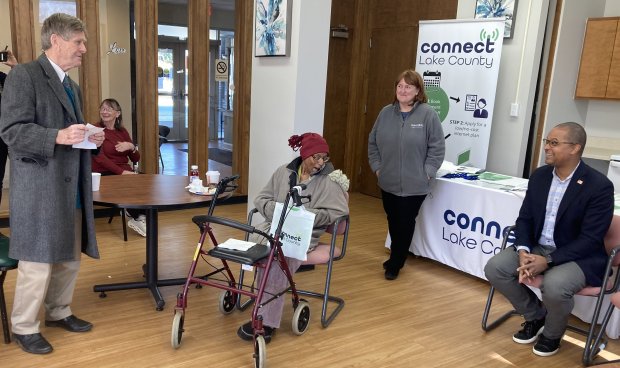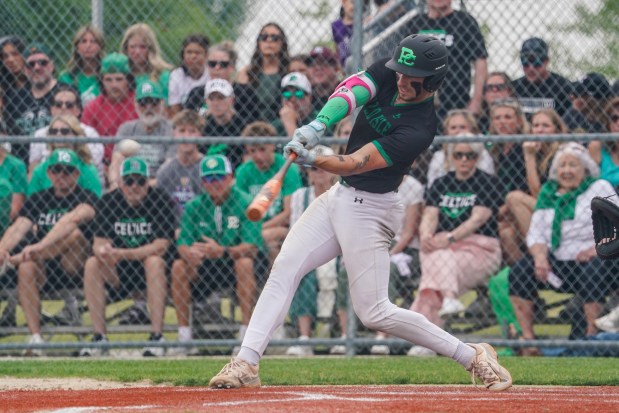Uncertain about getting connected to the internet when she met representatives from Connect Lake County, Debra Atwood is now hooked. She is also concerned the federally funded Affordable Connectivity Program (ACP) is about to end.
Since acquiring internet service through the ACP, Atwood has used her new skills to find a place to worship, start a business, get from place to place, meet people and more. She also takes the time to teach her neighbors what to do.
“I found a place to go to church, Atwood said. “If I didn’t have MapQuest, I wouldn’t know how to go anywhere. I started a knitting business, and it’s how I reach my customers. I help others in my building. I’m on a dating site. That’s for me. I’m hooked.”
Atwood was one of dozens of people, primarily seniors, telling their stories to Federal Communications Commission (FCC) Commissioner Geoffrey Starks Tuesday at Shiloh Tower in Zion, giving him information to advocate on their behalf for renewed funding.
“I’m going to focus on getting additional funding for the ACP,” Starks said after the event. “I’m going to talk to the White House and people on the (Capitol) Hill. I’m going to be their voice.
“It helps seniors connect with their children and their grandchildren,” he said.
Starks said while funding is scheduled to end in April, there is a $7 billion funding bill in Congress which he hopes will be passed before then.
Thomas Stokes told Starks how critical internet access is to him. Stokes said almost anything a person wants to do must be done online. It is essential for education and finding a job.
“If you don’t have it, you can’t apply for a job,” Stokes said. “You used to be able to go into the store and apply. Now it’s all paperless.
For Tim Foley, the internet helps him connect with out-of-town family and, of the utmost importance, enables him to use telehealth to get healthcare from anywhere in the country.
“I talked to the Cleveland Clinic and it helped me keep my memory, to keep my eyesight,” Foley said. “Now I can talk to the Mayo Clinic, the Cleveland Clinic and live a healthy life. I even texted my first message to my daughter.”
Paul Pissios is a retired teacher who considers himself computer literate. He continues teaching because, “We’re lifelong learners.” He said he also helps neighbors in his building develop skills.
“I keep in touch with my (former) students,” Pissios said. “I do it on Zoom. The internet helps keep us educated. Education gives you the information to make the right decisions. I don’t need to watch television, and watch those shows that cripple your mind. I have the internet.”
Taylor Ericson, Connect Lake County’s program manager, helps teach people how to develop their computer skills once they have access. She talked about a conversation she had with one of her students.
“He went on like in a public place, and was going to check his bank account,” Ericson said. “He told me he didn’t because of what I taught him.”
When President Joe Biden’s Bipartisan Infrastructure Bill was signed into law in November 2021, funding for the ACP was part of the legislation. Not long after that Connect Waukegan — now Connect Lake County — began helping people get online.
Along with helping people take advantage of funding for under-resourced individuals in Waukegan, North Chicago, Zion and the Round Lake area, Connect Lake County helped them get devices and taught them how to utilize the resources.
Candace Browdy, Connect Lake County’s executive director, said between April 2022 and the end of last year, Connect Lake County shepherded approximately 500 people through the process of connecting to the internet, and helped another 400 who eventually became connected.





